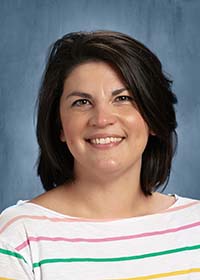Name 
Amanda Colson
School & School System Where You Work
Burns Middle School, Cleveland County Schools
Number of Years Teaching
14
Teaching Area(s)
Orchestra
Grade Level
Middle School
What do you love most about teaching music?
I love watching students discover their musical abilities. The best day is watching sixth grade play their instruments for the first time.
Who inspired you to be a music educator and how did they inspire you?
I have been blessed with many great music teachers in my life. The teachers who stick out the most in my memory are: Peter Strickland, Carol McSwain, Ed and Kathy Allison, Nancy Bargerstock, Eric Koontz, and Sally Ross. Each music teacher gave selflessly to inspire me to perform better and grow in my career. Each continue to provide encouragement and resources that build me up as I continue teaching public school music.
What did you need the most when you started teaching?
During my first year teaching, I needed help with the “basics”. I needed help setting up my gradebook, scheduling concerts, reserving performance venues, and navigating all the paperwork concerning all the off-campus activities we do as music teachers. I was so blessed to have colleagues like Amy Hinson and Patti Knauf, who took me under their wings and taught me how to function properly inside a school!
Describe the biggest challenge to teaching music education and how you have worked to overcome this challenge?
The biggest challenge is finding a place and a voice for music inside the school. Many administrators are not unsupportive, but they carry a huge burden. Their bosses don’t focus on music education, so their focus isn’t on music education. Advocating for myself, my colleagues, and music while maintaining good professional relationships has been the biggest challenge I’ve faced. I try to be a “team player” by contributing to our school vision and goals, while never being shy about vocalizing what the orchestra classroom needs to maintain success.
How do you advocate for your program?
I advocate by having my students be as visible as possible in the community. Anytime we have the opportunity to perform outside of school, I do my best to accept. Even though our orchestra program is 26 years old now, many members of our community still don’t know we have an orchestra program or understand what instruments are in the string orchestra ensemble. Our community also gives us a lot of resources and providing music for community occasions is a simple way to give thanks.
What is one piece of advice you would give to beginning teachers?
Get out of the arts wing, and get to know people. Volunteer to help with athletic ticket sales, talk to other teachers in the lounge, and if there is a chance to attend anything social among colleagues: attend it. Teaching requires compromise and understanding with your peers. If you want them to understand your hurdles and struggles, you must be willing to be acquaintances and understand their hurdles and struggles. You may even find that many of your colleagues have fond memories of their days in music class, and they can become great friends and advocates for your program!
How do you build relationships with students and parents?
Every student and parent is invested in the music program to some degree, because they’ve agreed to be in your class. Keep that in mind with every conversation you have with students and families. Also understand that every student will love music to varying degrees. A few will love it to the magnitude of their teacher, but most will love it as a rewarding past time. Get to know what each student loves. See their games, watch or inquire about their BOB and robotics competitions. If you see parents at school events, wave and small talk. Appreciate what everyone brings. Some will carry your program and some will give the bare minimum, but they’re all participating and giving.
